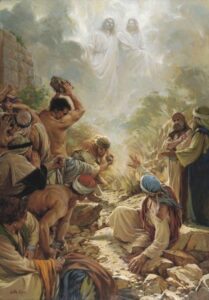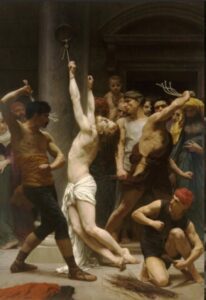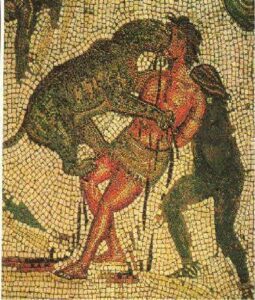Persecution of First Century Christians
The first two centuries of Christianity, a time of fervent growth and innovation, was also marked by periods of persecution. These threats came from three primary sources: the established Jewish authorities, the Pagan population, and the Roman imperial power. According to historian William Frend, “the troubles of the early Church were due as much to the virulence of the Christian–Jewish controversy as to any other cause.” Historian R.I. Moore attributes the cause of such persecution to “being hated by the masses on account of their increase in number and their ideological separation from society and its values.” Other academics suggest that “Christians suffered because of the irrational hatred of non-Christians for stereotyped conceptions of Christians’ supposed shared beliefs or behaviors.” Whatever the underlying reason, early Christians suffered significantly for their faith. Readers should note that the extent of persecution two millennia in the past is difficult to accurately assess the exact scale and nature of the threats since early Christian writings typically depicted persecution in dramatic terms.
Jewish Persecution
Early Christians, many of whom were Jewish converts, were seen as a heretical sect by many Jewish leaders. Their belief in Jesus as the Messiah and their departure from certain Jewish practices challenged the established religious order. Persecution was likely localized and sporadic and included:
-
- Exclusion from Synagogues: Christians were barred from participating in Jewish worship and communal activities.
- Social Ostracism: Public denunciation and social pressure was used to isolate and marginalize Christians within Jewish communities.
- Arrests and Trials: Jewish authorities might have instigated arrests and trials before the Sanhedrin, the Jewish high court, on charges of blasphemy or apostasy.

Pagan Persecution
David Nirenberg in his Communities of Violence theorized that Christians suffered not at the hands of outsiders but of those close to them, even other Christians, fed by rational, competitive urges within communities. Justin Martyr considered them “unworthy to be called ‘Christians even though they may have the teachings of Christ on the tips of their tongues” (First Apology of Justin, the Martyr 16.8).
Justin suggests that the persecutors believed themselves to be justified by the teaching that “every tree not producing good fruit is chopped down and tossed into the fire” (Matthew 3.10; 7.19; Luke 3.9). Their zeal led to a direct appeal to the Roman emperors: ‘”We request (ἀξιοῦμεν) that those not living in accordance with his teachings, and only called Christians, be punished by you (κολάζεσθαι… ὑφ’ ὑμῶν)’”(First Apology of Justin, the Martyr 16:14).

Roman Persecution
The Romans were primarily concerned with maintaining order and stability within their vast empire. Christianity, in the beginning, was considered “just a minor Jewish sect posing little threat to the traditional Roman pantheon and social order. Roman persecution depended on the specific emperor and local circumstances. Local authorities sporadically harassed Christians, disrupting their meetings or confiscating their property. In most cases, authorities were content to leave Christians alone unless they were accused of crimes like atheism (refusal to worship Roman gods) or disloyalty to the emperor.
Following Rome’s Great Fire in 64 CE, the Emperor Nero (37-68 CE) blamed Christians as the cause arrested them and actively persecuted them in murderous public spectacles where they were tortured and killed. According to tradition, this was the time that Apostles Paul (beheaded) and Peter (crucified upside-down on a cross) died.

